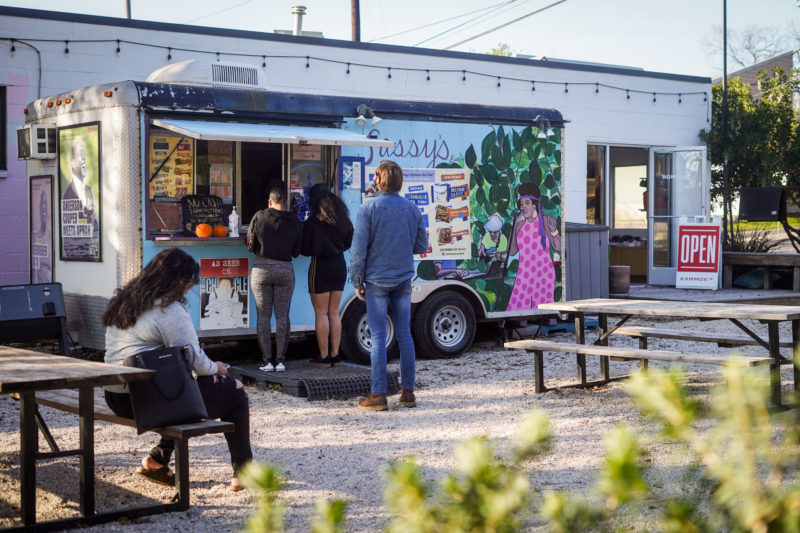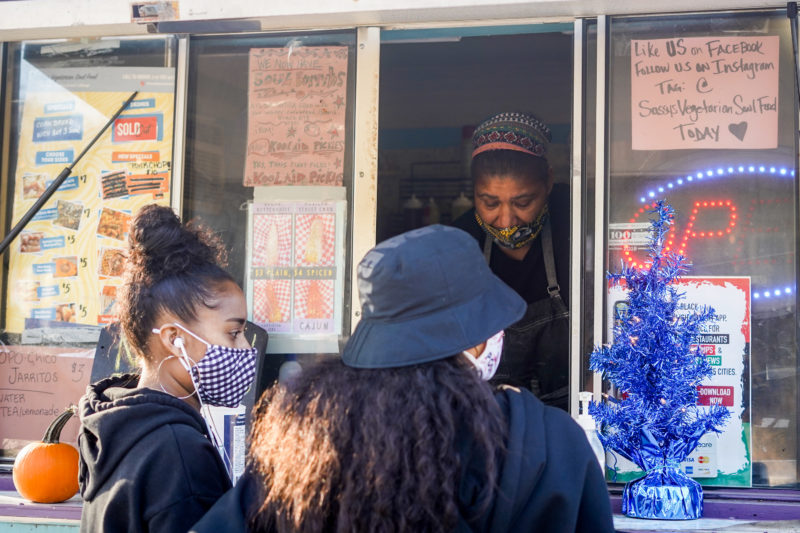Black-Owned Plant-Based Restaurants Taking Root in Texas
By Madelyn Gee
Reporting Texas

Customers line up to order from Sassy’s Vegetarian Soul Food, on Dec. 3, 2020, in Austin. Mary Kathryn Ferguson/Reporting Texas
Smothered pork chops. Greens with ham. Catfish (with a little hot sauce) — all dishes central to the Black food experience. So, what happens when these options are revamped without their most crucial ingredient — meat?
Many African-Americans simply are not used to having plant-based ingredients replace meat in the cuisine they grew up with. However, an increasing number of black-owned plant-based restaurants around the state are showing that going meatless is becoming more popular among African-American Texans.
According to a Vegetarian Research Group survey, about 8% of Black Americans are vegan or vegetarian compared to 3.4% of the general population. African-Americans are increasingly exploring plant-based ingredients, overcoming misconceptions about higher costs and less flavor, and, in the process, living healthier lifestyles.
Cynthia Nevels, chef of the Dallas vegan restaurant SoulGood, which features items such as “Vegan Chick’n and Biscuits” and “Keto Vegan Sausage Pizza.” Nevels adopted a vegetarian diet 15 years ago. She became vegan in 2019. As a vegan, she doesn’t eat any animal products — including meat, eggs, cheese, butter, milk and honey — or foods that are processed using animal products. In contrast, vegetarians don’t eat meat.
James McGee, owner of the Dallas restaurant Peace Love and Eats Smoothie Bar, started the eatery in 2018. His restaurant has been plant-based for 5 years, he said. The restaurant offers fruit and vegetable smoothies as well as a build-your-own smoothie bowl.
The African-American community in Texas has the power to live healthier and ease into a plant-based lifestyle, and he is glad to see more African-Americans exploring plant-based diets.
“[It is important to] invest in living a healthier lifestyle that most of us were not afforded to when we were younger,” McGee said.
Studies confirm that the plant-based offerings improve health.
A 2014 meta-analysis published by AMA Internal Medicine found that a vegetarian diet reduces blood pressure and helps prevent diseases such as cancer and Type 2 diabetes.
This diet also provides mental health benefits. A study conducted by the Physicians Committee for Responsible Medicine found that arachidonic acid, a type of fat only found in animals, results in “a cascade” of inflammatory chemical reactions in the body. In the brain, arachidonic acid can cause depression, anxiety, or stress. The study found that those avoiding this type of acid tend to “report a happier, more positive mood.”
Robin Beltrán, co-founder of The Black Vegan Company in Austin, knew her diet needed to change after her husband’s intestines were shredded during a robbery five years ago. It took him three years and 14 surgeries to recover, and when he did, Beltrán realized their meat-based diet was causing inflammation and pain, she said. The couple went vegetarian.
“My skin changed, my hair changed … his PTSD changed, his body changed,” Beltrán said. “It cured our family.”
Felecia Allmon-Harris, co-founder with her wife Staci Allmon-Harris of the Houston vegan restaurant HIPP Vegans, started her vegan journey in 2017 after doctors diagnosed her with a high platelet count that could lead to a stroke.
“I started doing a bunch of research. Everything talking about boosting the immune system kept pointing in the direction of a plant-based diet,” Allmon-Harris said.
“Everything in my body just totally changed — my cholesterol, my blood pressure, my A1C numbers (which are for diabetes) — everything just came down,” Allmon-Harris said.
Plant-based diets are no more expensive than omnivorous diets, practitioners say.
“I was able to feed my kids more in the vegetarian lifestyle for less than I was when we used to eat meat,” Nevels said. “The challenge in our community is that we have forgotten how to cook.”
“We have forgotten how to be creative in the kitchen and to use what we have because of the convenience lifestyle that we are used to,” Nevels said.
Kimberly Renee, founder of Might Be Vegan in Atlanta, Georgia, acknowledged that food labeled vegan can be expensive.
“When you buy vegetables, and legumes and fruit, you do not pay as much,” Renee said. “At the end of the day, economically, I am spending a lot less money,”
Along with her brands Might Be Vegan and Instagram TV cooking show “Trap Kitchen,” Renee has recently started the national relief effort “Food Love.” Through “Food Love,” Renee and her partners are offering plant-based meals delivered to the door in minority communities around the country deeply affected by COVID-19.
“I read an article that said that people of color were dying at twice the rate of their white counterparts … 98% of the people that were hospitalized had a pre-existing condition.,” Renee said. “We know there is a ton of research around people who have decided to take on a plant-based diet and how they have reversed obesity, hypertension.”

Andrea Dawson, owner of Sassy’s Vegetarian Soul Food, takes orders from customers on Dec. 3, 2020, in Austin. Mary Kathryn Ferguson/Reporting Texas
Andrea Dawson, owner of Sassy’s Vegetarian Soul Food in Austin, said a plant-based diet has deep roots in African culture.
“Ancestral African eating, most of it is that meat is a flavoring to a dish. So there is a little bit of meat and a lot of rice,” Dawson said. “Most meals, historically, did not include a lot of meat. In my opinion, it is not our natural way of eating. I think we developed this other way of eating through slavery because that is what we had to eat.”
“There is a possibility to think about food in another way and to make it pleasing and for it to not be so laden with so many things that are just not healthy and not good for us,” Dawson said.